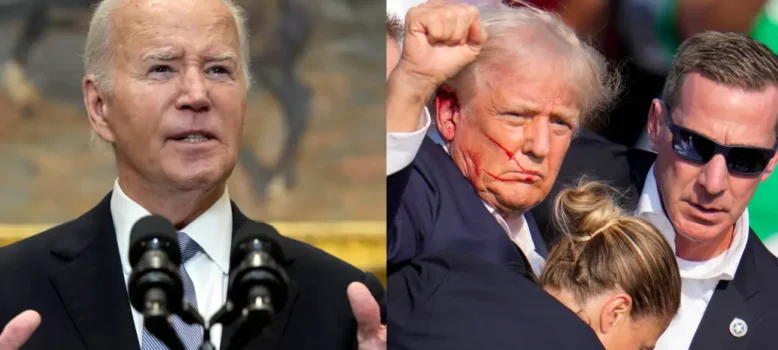
From A Staged Events to Deep State: Here Are The Wildest Conspiracy Theories About Trump’s Assassination Attempt

NEW – Trump Assassin video shows him crawling on the roof while multiple people point him out to police
They yelled about him for *almost an entire minute*
It’s insane how Secret Service allowed this amateur to almost kill Trump pic.twitter.com/CWfHBGzOCp
— DC_Draino (@DC_Draino) July 15, 2024
In the wake of the recent assassination attempt on former President Donald Trump, social media platforms have become breeding grounds for conspiracy theories. Here are five of the most prominent conspiracy stories currently circulating:
- The “Staged Event” Theory
One of the most widespread conspiracy theories suggests that the assassination attempt was staged for political gain. Proponents of this theory point to doctored images showing Trump smiling after the incident, which have been shared hundreds of thousands of times on social media platforms. These manipulated photos have fueled baseless claims that the event was orchestrated to boost Trump’s political chances. - The “Deep State” Involvement
Some conspiracy theorists are pushing narratives that implicate shadowy organizations or political opponents in the assassination attempt. These unfounded claims often involve complex plots allegedly orchestrated by high-level government officials or secret societies, reflecting a deep-seated distrust in established institutions. - The “False Flag” Operation
Another popular conspiracy theory suggests that the shooting was a “false flag” operation designed to distract from other political issues or to justify future actions. This theory often intersects with claims of staged events, further muddying the waters of public discourse. - The “Insider Knowledge” Claim
Some social media users have shared posts claiming to have insider information about the shooting. One widely circulated post, sourced from the anonymous message board 4chan, falsely claimed to be from a countersniper at the rally who was prevented from taking action. Such unverified claims have gained significant traction despite lacking credible sources. - The “Political Opponent Orchestration” Theory
Conspiracy theories blaming political opponents for the assassination attempt have also gained traction. Some of Trump’s allies and supporters have taken to social media to baselessly accuse President Biden’s campaign of being behind the attack. These unfounded allegations further polarize the political landscape and contribute to the spread of misinformation.
It’s crucial to note that these conspiracy theories lack credible evidence and often contradict official statements and investigations. The proliferation of such theories highlights the challenges posed by social media in the spread of misinformation, especially in the aftermath of shocking events.Law enforcement agencies, including the FBI, are actively investigating the incident, focusing on uncovering the true motives of the identified shooter, 20-year-old Thomas Matthew Crooks. As the investigation continues, it’s important for the public to rely on verified information from official sources rather than speculative and unsubstantiated claims circulating online.The spread of these conspiracy theories underscores the need for critical thinking and media literacy in navigating the complex information landscape of social media. It also highlights the responsibility of social media platforms in moderating content and curbing the spread of dangerous misinformation.
If you don't think that shit was staged? Look at how fast they got trump outta there at just the mention of someone in the crowd having a gun in 2016. Then look at this goofy as shit. pic.twitter.com/zqZMHRO5jT
— Ok (@FirstName736928) July 14, 2024











